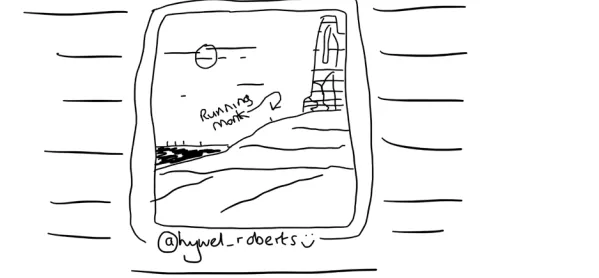The fog clears, and here we are.
Year 6 have been studying Vikings. I know this because they tell me EVERYTHING you could possibly need to know about Vikings, their lives and their culture. I ask them the lovely inductive question: “I know a bit about Vikings - can you tell me more?”
The responses come thick and fast. Laura, their ace teacher, is buzzing at their retrieval practice in action.
Vikings, it turns out:
I draw a window, and through it we see the ocean shoreline and a cliff. On the cliff, we see a grand, windswept building: the monastery.
I sit in my humble abode, looking at the monastery, the place I serve. Supporting the monks of the monastery, I farm the land.
Humble abode
The children tell me what I might grow on my hard-won ground. We also think of the animals the man might tend to. Then we think of his house, his shack.
What might we find in this humble farmer’s abode? I ask.
Cecily tells me I might have a bowl of seeds, and I nod in agreement and draw them on the shelf that sits under my view, near my chair.
Joshua says that there will be a bed of goatskins in the corner of the room. He points (at the teaching assistant, Ms Minchin) and we all look.
“Yes, a dark corner of the room where the farmer sleeps,” I narrate. Ms Minchin raises an eyebrow. I nod at her to say, “Don’t worry.”
Millie points and says that there is a cross on the wall. We all look, and I nod, saying, “He is a man of faith.”
The uncertainty of silence
Darcy puts up her hand.
I smile and will her on.
“Will he have anything precious?” Darcy asks.
I’m about to respond to this lovely question when Sam jumps in: “He won’t have anything, I don’t think. All the precious stuff is in the monastery.” He points at the view through the window on the flipchart paper.
“I think you’re right,” I respond.
We all look through the window and I tolerate the uncertainty of silence.
I grab my marker and add some detail to image. I add some dots - a few on the horizon out at sea and another near the monastery.
I narrate: “I sit and look from the relative comfort of my home, out towards the sea, the beach, the cliff and our beloved monastery.
“As I look, I see one of the monks from the monastery, running, shouting and pointing back to the beach whence he came.
“The driftwood he is carrying is thrown to the ground as I watch him. I can just make out his words as they are carried to me on the island breeze.”
“Vikings,” says Sam, jumping in again. I notice the class are all staring at the “window”. Again, the classroom is silent.
Pray? Hide? Escape?
I move the class on. We stand around the classroom, in our own spaces, with all eyes focused on me.
I clasp my palms together, wrapping my fingers around the opposite hand, as if in prayer. I repeat the movement and the children repeat the action.
I speak again, informing them that warriors are approaching to rob our monastery and crush our way of life. “What are we to do, brothers?”
Darcy writes up our options on a white board:
- Talk to them.
- Pray.
- Hide.
- Take our precious things and hide in a cave.
- Escape on boats.
- Fight with words.
- Give precious things in exchange for our lives.
Sam steps forward and offers to stay with the building and its contents, while we leave with what we can carry.
This is a real act of courage and, in my teacher-head, a pinball has flown, clanging on the sides of my professional imagination.
A few moments later, the children are back at their desks, watching as Sam sits on the class teacher’s swivel chair. He sits perfectly still, clutching a Match of the Day annual from 2011 as if it is the most holy of tomes. And he waits for the inevitable.
We all rise from our chairs and move to stand around Sam, and I offer this: “The Nordic warriors found the monk sitting on his own at the monastery gate. He held a large book in his hands. He clutched as if he loved it.
“He looked up at the exploring invaders, standing with their axes, their forked beards and their helmets of war.
“All was quiet.”
And the fog descends.
Sometimes, silence is indeed golden.
Hywel Roberts is a travelling teacher and curriculum imaginer. He tweets as @hywel_roberts. Read his back catalogue and follow him on Facebook





